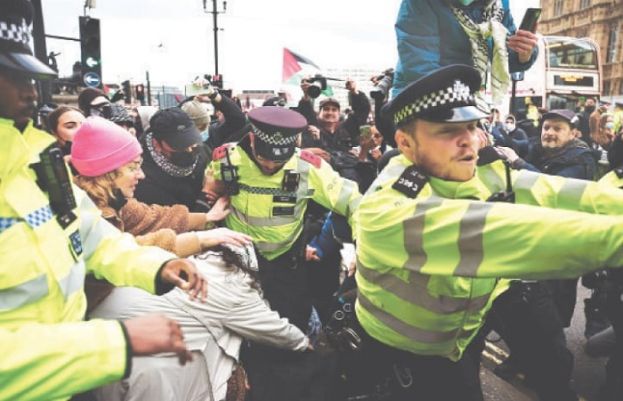Israel bombed southern Gaza on Saturday as the UN warned that the besieged Palestinian territory has been rendered “uninhabitable” by three months of war. Top Western diplomats were in the region as part of a fresh push to boost the flow of aid into Gaza and address mounting fears of a wider conflict. The Egyptian Red Crescent on Friday said 1,200 water purifiers, 100 oxygen cylinders, one oxygen generator, 1,000 solar-powered items, 24 power generators and 418 medical supplies had been blocked by Israel from reaching Gaza since the conflict started. The fighting, triggered by the October 7 attacks on southern Israel by Hamas, has sent tensions soaring across the region, and shows no signs of abating with the conflict entering its fourth month. Civilians in the Hamas-ruled Gaza Strip have borne the brunt of the violence as the scale of the destruction has triggered mass displacement and a deepening humanitarian crisis. With swathes of the territory already reduced to rubble, UN humanitarian chief Martin Griffiths said “Gaza has simply become uninhabitable”. The UN official said famine was “around the corner” as people in Gaza faced the “highest levels of food insecurity ever recorded”. Gaza had become “a place of death and despair”, said Griffiths. “Hope has never been more elusive.” A public health disaster is unfolding as infectious diseases spread in overcrowded shelters, Griffiths said. Around 180 Palestinian women “are giving birth daily amidst this chaos”, Griffiths said in a statement issued by the United Nations Office for the Coordination of Humanitarian Affairs. AFP correspondents reported Israeli strikes on the southern city of Rafah, where hundreds of thousands of people have sought shelter from the fighting. On Israel’s northern border, Lebanon’s Hezbollah group said it launched its “initial response” to the killing of Hamas’s deputy leader Saleh al-Aruri in Beirut. A US defence official has told AFP that Israel carried out the strike, which Israel has not claimed. Hezbollah said it had targeted the Israeli military’s Meron air control base with 62 missiles, while the Israeli army reported “approximately 40 launches from Lebanon” early on Saturday, and said it struck Hezbollah “military sites” in response. A military spokesperson confirmed the mountaintop base had been targeted but did not say whether it was damaged. No casualties were reported in Israel. Lebanon’s Jama’a Islamiya Islamist group said it had also fired two volleys of rockets at Kiryat Shmona in northern Israel, in the third operation claimed by the militant Sunni group since Oct. 7. European Union foreign policy chief Josep Borrell, on a visit to Beirut, warned against a wider war. “It is imperative to avoid regional escalation in the Middle East. It is absolutely necessary to avoid Lebanon being dragged into a regional conflict,” he said. Before heading to Saudi Arabia, Borrell called for a redoubling of peace efforts. “Israel has declared a goal to eradicate Hamas. There must be another way to eradicate Hamas that doesn’t… create so many people getting killed,” he said. In the central Gaza town of Deir al-Balah, men clambered carefully around the concrete ruins and twisted rebar where Mohammad al-Attar’s house stood before rockets that he blamed on Israel destroyed it. “There was no prior warning or anything,” Attar said, his hands stained grey from the debris. “There’s still the corpse of a little girl” underneath. A spokesperson for the Israeli military claimed that “we have completed dismantling Hamas’s ‘military framework’ in northern Gaza and killed around 8,000 of its fighters in that area. The Israeli forces have also seized tens of thousands of weapons in Gaza’s north and millions of documents, Rear Admiral Daniel Hagari said in an online briefing. “We are now focused on dismantling Hamas in the centre and south of the Gaza Strip.”
Gaza has simply become ‘uninhabitable’, says UN

